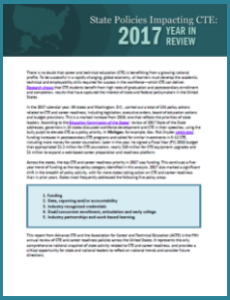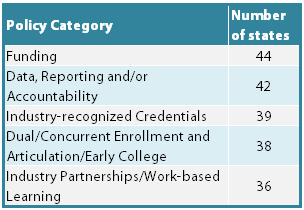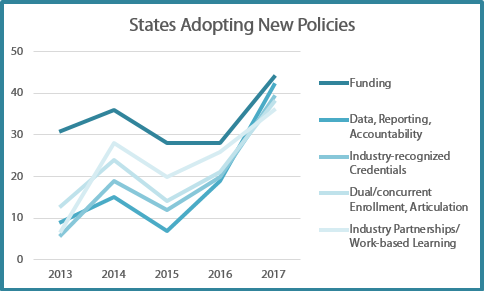 2017 was a banner year for Career Technical Education (CTE). Overall, 49 states and the District of Columbia passed a total of 241 policies related to CTE and career readiness, a marked increase from 2016. But while it is encouraging to see a groundswell of enthusiasm for CTE at the local, state and national levels, how will states leverage CTE’s momentum and ensure that state action translates to better outcomes for students?
2017 was a banner year for Career Technical Education (CTE). Overall, 49 states and the District of Columbia passed a total of 241 policies related to CTE and career readiness, a marked increase from 2016. But while it is encouraging to see a groundswell of enthusiasm for CTE at the local, state and national levels, how will states leverage CTE’s momentum and ensure that state action translates to better outcomes for students?
Today, Advance CTE and the Association for Career and Technical Education (ACTE) released the fifth edition of the annual State Policies Impacting CTE report, examining activity from 2017. To develop the report, Advance CTE and ACTE reviewed state activity, cataloged all finalized state actions and coded activity based on the policy area of focus. For 2017, the top five policy areas of focus include:
- Funding.
- Data, Reporting and/or Accountability.
- Industry-recognized Credentials.
- Dual/Concurrent Enrollment and Articulation/ Early College.
- Industry Partnerships/ Work-based Learning.
Funding was at the top of the list for the fifth year in a row. Policies in this category include a $16 million one-time appropriation for CTE equipment grants in Tennessee, the development of a productivity-based funding index for Arkansas institutions of higher education and a workforce development scholarship authorized through Maryland’s More Jobs for Marylanders Act of 2017. With few exceptions, state legislatures renewed or increased appropriations for CTE programs and related activities.
 There was also a lot of activity related to data, reporting and accountability, largely due to state work around the Every Student Succeeds Act (ESSA). In 2017, 35 states identified measures of career readiness in their federal accountability systems, and many of these measures included industry-recognized credential attainment, dual-credit completion and work-based learning participation.
There was also a lot of activity related to data, reporting and accountability, largely due to state work around the Every Student Succeeds Act (ESSA). In 2017, 35 states identified measures of career readiness in their federal accountability systems, and many of these measures included industry-recognized credential attainment, dual-credit completion and work-based learning participation.
While 2017 set a new high-water mark for state activity, a look across the past five years of this report illustrates that states are doubling down on a few policy priorities.
With the exception of 2015—when fewer states passed policies related to Industry-recognized Credentials or Data, Reporting and Accountability—these five policy areas have been the top priorities for states every year that this report has been published. This is no surprise, given that much of the conversation in the CTE field over the past five years has centered around accountability, credentials of value, dual enrollment and work-based learning. Even compared to recent years, states were more active in 2017, and there was a spike in the number of states adopting new legislation or rules in these policy areas.
So what lessons can be drawn from this year’s state policy review? For one, the enthusiasm for CTE is real. State legislatures, governors and boards of education are coming to recognize what the CTE community has known for years: that high-quality career preparation helps learners develop academic, technical and professional skills and results in positive rates of graduation, postsecondary enrollment and completion, and ultimately career success.
But it is also important to make a distinction between the quantity of policies passed and the quality of their implementation. 2017 was a record year for state CTE policy, but now comes the true test. State leaders should follow through on the policy commitments made in 2017 by sustaining funding for critical programs, identifying and adopting policies to ensure CTE quality, and taking time to evaluate the implementation and effectiveness of existing policies.
A copy of the report, State Policies Impacting CTE: 2017 Year in Review, is accessible in the Learning that Works Resource Center. Advance CTE and ACTE are also hosting a webinar on January 31, to unpack findings from this year’s review (registration for the webinar is at capacity, but a recording will be available following the webinar at https://careertech.org/webinars).
Austin Estes, Policy Associate

